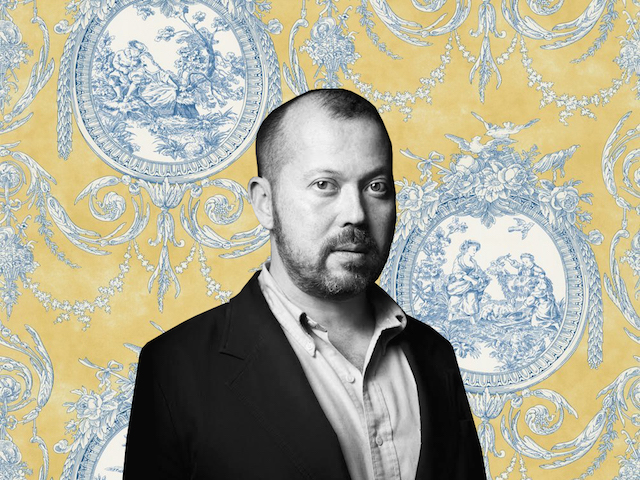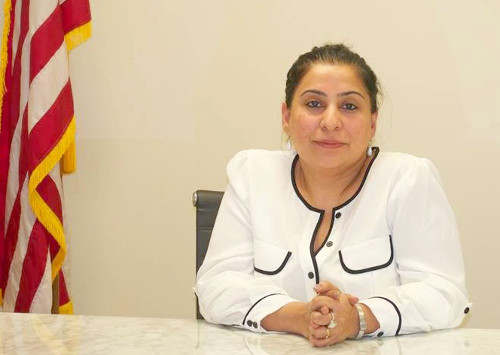…there was one piece of equipment that made it all possible: a SONY tape player that kept them in operation as if they were 24-hour newsroom. The machine would play ten cassettes one after the other.
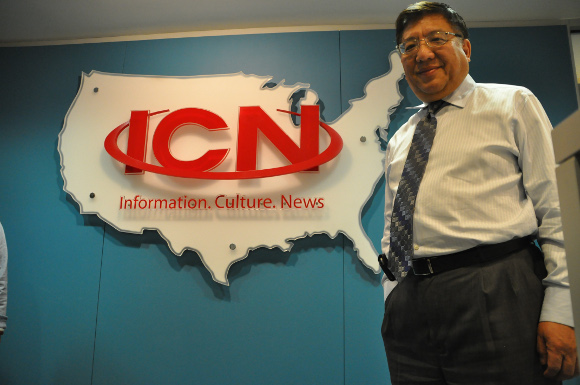
January 15, 2014
When Richard Hsueh started his radio venture Chinese American Voice (CAV) in Flushing, the studio was barebones. It was 1986, and the fledgling company only had the necessary equipment—mixers, mics, reel-to-reel tape players. Six paid employees hosted and produced shows and did routine office duties in an office upstairs from a bakery on Union Street in Flushing.
According to Hsueh, there was one piece of equipment that made it all possible: a SONY tape player that kept them in operation as if they were 24-hour newsroom. The machine would play ten cassettes one after the other. Each night before the end of the workday, it was set up to cycle in reruns of the morning and afternoon programs.
“It was not too fancy,” Hsueh recently said of the makeshift operation.
Hsueh helmed the station for twenty-five years. Chinese American Voice was one of the earliest Mandarin-language stations in New York City and the first Chinese-language radio station based out of Flushing. But this past year, at age 65, he officially retired as general manager, ushering changes for the operation that he built. However, he will keep his Sunday morning show, “Let’s Talk,” where he discusses the news affecting the Chinese community. Some recent topics include Obamacare, China’s historic robotic moon landing, and a recent brash of jewelry thefts in Flushing, Queens and Manhattan’s Chinatown.
In many ways, Hsueh was born to be a broadcaster and a journalist. The timbre of his deep clear voice falls shy of baritones like James Earl Jones but is not as tinny as Orson Welles. And–he exudes curiosity. When I sat down and spoke with him recently at a Sheraton in Flushing, he wanted to know my honest opinion—as a Korean American—of what Koreans thought about Kim Jung-un and whether reunification was ever possible.
Back then, downtown Flushing might have been unrecognizable to those who know it today as a bustling mecca of activity. Businesses were shuttered, and Main Street had an empty, depressed feel.
Hsueh chose the Sheraton Hotel because it was the former location of the headquarters of the World Journal newspaper, where as a 30-year general assignment reporter, he covered the emerging Chinese community. He had arrived just a year earlier from Taiwan in 1979, and lived in nearby Bayside.
Back then, downtown Flushing might have been unrecognizable to those who know it today as a bustling mecca of activity. Businesses were shuttered, and Main Street had an empty, depressed feel. While there were a handful of Japanese immigrants and an even smaller scattering of Koreans, the Asian population was small. Only two Chinese restaurants existed in Flushing, Hsueh recalls. But, jobs, affordable housing and a relatively easy commute to Manhattan made it an ideal place for recent immigrants.
As the Asian population grew, Hsueh decided to strike out on his own venture. In 1986, he left his job at the World Journal, and started CAV using the seed money, $60,000, he raised through friends and investors, including contacts he met at the Journal.
“We all thought this radio station should be a good vision,” explained Hsueh.
At the time, there was no Chinese television programming and many new immigrants depended on newspapers like the World Journal, which ran a home delivery service. But even newspapers often arrived at least a day after printing.
The station was a subcarrier frequency, so listeners had to buy special subcarrier radios from the Chinese bookstore or supermarket. His wife had a job in the accounting department at a bank, so he wasn’t too worried to take the financial risk.
“We tried to deliver fresh news,” said Hsueh and added that much like today, there was a desire from people to know what was happening in their newly adopted country and the one they’d left behind. At the time, there was no Chinese television programming and many new immigrants depended on newspapers like the World Journal, which ran a home delivery service. But even newspapers often arrived at least a day after printing.
Ethnic media, historically, has been a bridge for immigrants to their community and news of their home country. Barbara Reed, an associate professor of media and journalism at Rutgers University, explained in a recent phone interview, “What these publications and larger media with broadcast have stood for is not only getting the hard news and being an advocate for the ethnic group in this country and also pointing out the problems in the home country.” Reed, who specializes in the history of ethnic media, explained “The advocacy part is pointing out outright discrimination in the [new] country.”
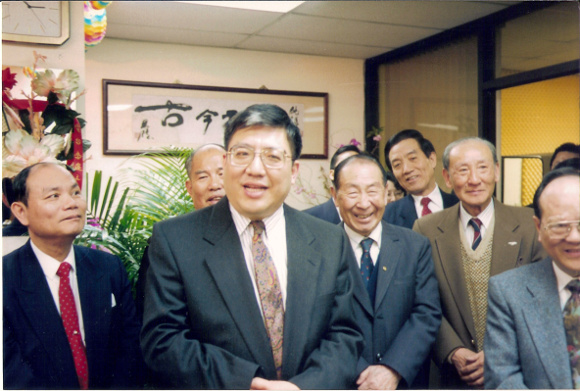
Michael Wang, the director of Nan Shan Senior Citizens Center in Flushing and an early listener of CAV, recalls that the station filled a void. Without cable news, Wang said that Hsueh, whom he described as an easygoing and creative person, would provide timely and vital information on immigration about social services and educational programs. In 1986, the same year Hsueh started the Voice, Wang had also began offering services to the community’s seniors and asked Hsueh to promote his programs on air.
“He invited all kinds of speakers on his show,” said Wang of Hsueh. “He interviewed lawyers or medical doctors who talked about issues [that were of] immigrant interests.”
Local politics was also a favorite topic on Hsueh’s morning show, which aired from 7:30 a.m. to 9 a.m. In many ways, the Chinese American Voice has become one of the platforms that promoted and supported Asian American elected officials from Flushing such as Jimmy Meng, the first Asian state assemblyman, his daughter, Congresswoman Grace Meng, and recent mayoral candidate and former city councilman, John Liu. And, despite alleged scandals that brought some negative attention to these elected officials, Hsueh says he did not shy away from reporting these events. His biggest concern was providing a platform for the candidates whom he felt could promote the concerns of Asians.
Hsueh is proud that his radio station helped to mobilize Asian voters. “We interviewed all the Chinese background candidates. And we introduced them and then we encouraged them to [get to] know better those candidates. We were very effective in elections,” said Hsueh. “That part I think we did a very good job. We did our job.”
Hsueh was particularly instrumental in getting his community to know John Liu, currently the New York State Comptroller and a recent mayoral candidate, when he was a young fresh face in Flushing. Liu has appeared on Hsueh’s morning program over a hundred times since the late 1990s.
“Richard was very supportive when I first ran for City Council in 1997. I lost that election, but Richard kept in touch, and beginning in 1998 invited me on his show regularly to discuss community issues,” Liu said in an email. “I continued to go on the show with him every month after I was elected Council Member in 2001 and Comptroller in 2009 because he gave me opportunities early on when few others would.”
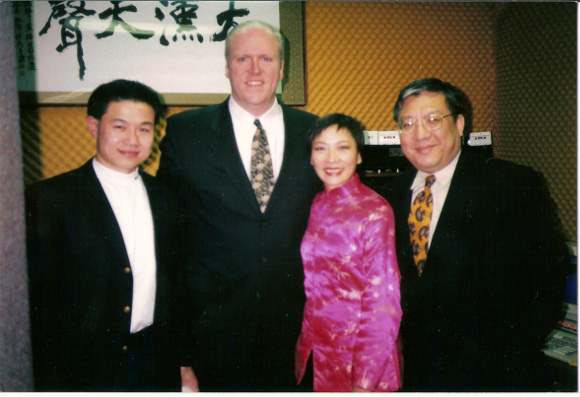
Aside from politics, the station tried to provide relevant artistic and cultural programming. Pichu Hsiao, who was well-known in Taiwan as a choral conductor, began to host a show called “Hometown Club,” where she talked about music and local news. Another host, Grace Chiang, was only 19 or 20 when she began hosting a Chinese pop music show.
Belinda Hsu, the host of “Women’s Magazine,” which has been broadcasting on CAV since 1986 covers topics such as cooking, health and beauty. But it also deals with heavier and more serious concerns not often expressed in the community. Hsu said one of her most memorable shows was when “Chinese housewives that were courageous enough to stand out and speak out” came on her show to talk about domestic violence that they experienced in their households.
Through a translator, Hsu explained there were not many institutional supports for Asian women at the time. After that episode aired, she received phone calls directly from women about their abusive husbands, and she would have to redirect their call to professionals in the community who were better equipped to handle the queries.
There was also an evening news broadcast with a handful of rotating hosts, along with Chinese radio dramas Hsueh purchased from Taipei or Beijing outlets. And at night, before midnight, they would shut the lights off and set up the ten-tape player and to run until the early morning.
“They provided me every day 10 minutes of Taiwanese news. They sent prerecording[s] from Taiwan by telephone,” said Hsueh. “We received it here with the recorder.” But things got gradually expensive with long-distance calling…
Initially, Hsueh also had high hopes of having overseas correspondents to report news from abroad. Before he immigrated in the U.S., he worked as journalist and broadcaster in Taiwan and also went to college for journalism there. So he enlisted the help of friends and colleagues back home. “They provided me every day 10 minutes of Taiwanese news. They sent…prerecording[s] from Taiwan by telephone,” said Hsueh. “We received it here with the recorder.” But things got expensive with long-distance calling, and in order to reduce costs, they scrapped a lot of these segments.
One of the most memorable news events took place on June 4,1989, during the Tiananmen Square massacre. American networks like CNN and CBS were doing live broadcasts, and Hsueh spent the entire day watching programs like CNN and CBS and essentially translating and conveying what was happening on the ground—important for those who could not understand the English broadcasts. “What Dan Rather said…we said. “People in Flushing and in New York, the Chinese were very concerned.” He also spoke with a prominent student leader Zhou Duo, who was on the ground weeks before the fateful June Tiananmen massacre. Zhou described “extreme chaos” at the square and that the situation was “worse and worse.
In the 1990s, two more Mandarin radio stations cropped up in the New York metropolitan area, and by then Chinese language television stations were starting too. Eventually, advertising suffered. When Information Culture News (ICN), a Los Angeles based Chinese network, approached Hsueh, about expanding to the New York city market, he welcomed the merger.
Much has changed since reel-to-reel. Nowadays, besides buying a special radio, listeners can now tune in by streaming online and can even listen by phone. Chinese American Voice is now also accessible through the ICN mobile app.
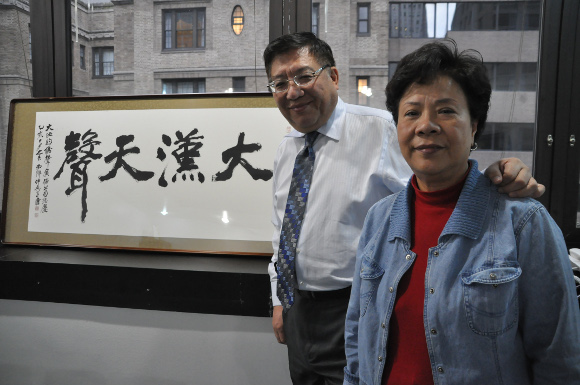
Hsueh says while traditional media like newspapers and radio will always have a place, competition has been tough with new media. And the people who listened to him in its heyday are now an aging generation, so the station’s future has been looking to appeal to a younger audience too.
On another occasion, I met Hsueh at the offices of ICN, where the station now operates from a lofty building near Grand Central in Manhattan. In a wall-encased bureau, there were a dozen plaques and awards CAV had won over the years. He said that he was happy to receive them but that was not the only reason he is proud of his station and newsroom. The connections he made with his listeners, he hopes, will be the legacy. He pointed to some of the early days, when, because of storms or transportation delays, he would not make it into the office on time for his morning broadcast and there was dead air. The minute he would arrive in the office, he would receive calls from listeners. “What happened? Are you sick?” they would ask him. “They make you feel warm. They would call, but they [were] not blaming you or cursing you. They were concerned.”
Richard Hsueh interviewing prominent student leader and Chinese activist Zhou Duo, in May 1989. Later, Zhou managed to negotiate with soldiers on June 4 to withdraw peacefully and avoid bloodshed.
Transcript
(Translation assistance from Yu-Kang Chen)
Hsueh: Can you tell our audience what the students at the Beijing Tiananmen Square are thinking?
Zhou: Forty percent of the students, their opinion is that we cannot retreat now, but we can find a right moment to retreat, retreat in a respectful and victorious way.
Hsueh: What would be…what would be a right moment?
Zhou: We have to see how things develop.
Hsueh: How many students are there now?
Zhou: It is hard to tell the total number. Maybe several thousands.
Hsueh: Can you describe to our audience the current situation of Tiananmen Square? We heard that a Statue of Liberty sculpture has set up, and that students’ health are threatened due to the accumulated garbage. Can you tell us more about it?
Zhou: I think it can be described by the following words – extreme chaos and low-spirit.
Hsueh: Extreme chaos…can you explain more?
Zhou: I can say that there is no command center at the square. Although…there has always been some kind of temporary command center, it collapses very quickly. After the collapse, a new one would be created. No command center was able to command and control the whole square. And that…because of the disorganized state and the low-spirit, the atmosphere of the square has become worse and worse. Our image has become worse and worse too. If it continues in this way, I don’t think we can become a symbol of the student movement. On the contrary, we may become a black spot of the student movement, a big black spot. So students are very worried too. And other folks from the society, such as…now there is a society negotiation meeting, they are also helping the student to organize. They requested the students to restore the order of the square as soon as possible….the purpose of restoring the order is that this is the only way we can have a dialogue with the government.

